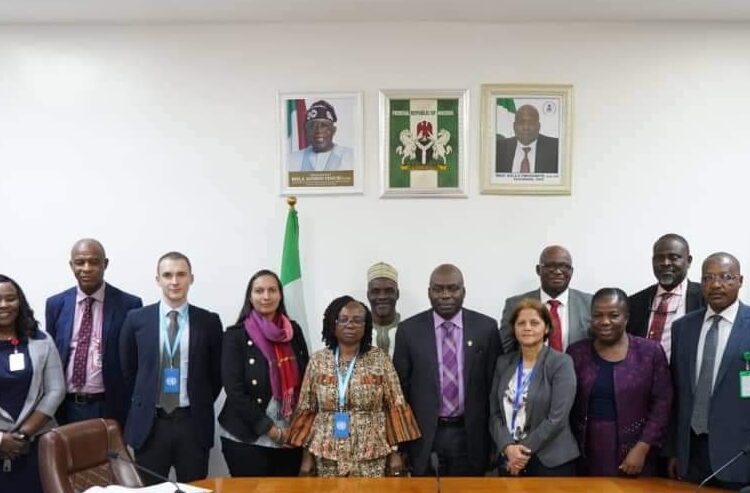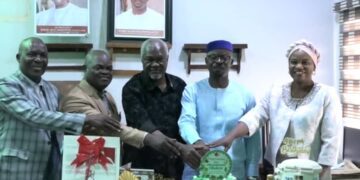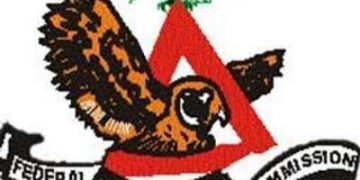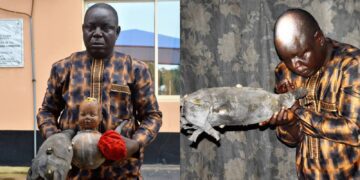The Independent Corrupt Practices and Other Related Offences Commission (ICPC) on Monday, played host to representatives of the World Bank and the United Nations Office on Drugs and Crime (UNODC) on the Stolen Asset Recovery (StAR) initiative.
The meeting with the Technical Assistance Mission team from the World Bank and UNODC was hinged on exploring ways that the StAR initiative can support the implementation of asset recovery resolutions of the United Nations Convention against Corruption (UNCAC).
In his address at the meeting, the Chairman of ICPC, Professor Bolaji Owasanoye, SAN, OFR, explained how the Commission had been managing seized and forfeited assets especially with the instrument of the Proceeds of Crime (Recovery and Management) Act (POCA) 2022.
He stressed that the POCA Act had not only helped in bridging the architectural gaps in the fight against corruption but also was serving as a good working instrument for ICPC and other anti-corruption agencies.
He however noted that the POCA Act was still running a test period as many agencies were yet to have a full grasp of its potentials and its possible challenges.
“On a general note, I would say that POCA is still running the test period. For example, with regard to the management of assets, there are different frameworks prescribed by the law. It can be through the National Assembly, it can go through the Federal Executive Council (FEC).
“But the problem here is that when you make a recovery, you put it in a consolidated properties account, which you don’t have access to. So, if you then need to repair an asset, you cannot take money from that account. You have to wait till the next budget cycle. So, what is the point? Same thing if you dispose of assets, you have to pay the professional, the auctioneers, valuers and all that, when the money has gone into the consolidated properties account, you cannot touch it.”
While speaking on behalf of the mission team, a financial sector specialist with the World Bank, Elsa Gopala Krishnan, stated that the objectives of the mission was to deliver activities on the topic of management of proceeds of crime, organise workshops for relevant agencies under the recently adopted Proceeds of Crime Act and conduct meetings on Nigeria’s participation in a follow-up meeting to the Global Forum on Asset Recovery (the GFAR Action Series).
She said, “I am here with UNODC and the World Bank as part of the StAR initiative to look at the new program and looking at supporting Nigeria in implementing this (POCA) law in a way that is effective and really solves many of the problems everyone had hoped it would solve.
“I know people refer to it as a training or technical assistance, but really we’re going to spend the next two days trying to properly solve issues and come up with a program that helps us implement an asset management capacity that works for everybody in this country.”
The Independent Corrupt Practices and Other Related Offences Commission (ICPC) on Monday, played host to representatives of the World Bank and the United Nations Office on Drugs and Crime (UNODC) on the Stolen Asset Recovery (StAR) initiative.
The meeting with the Technical Assistance Mission team from the World Bank and UNODC was hinged on exploring ways that the StAR initiative can support the implementation of asset recovery resolutions of the United Nations Convention against Corruption (UNCAC).
In his address at the meeting, the Chairman of ICPC, Professor Bolaji Owasanoye, SAN, OFR, explained how the Commission had been managing seized and forfeited assets especially with the instrument of the Proceeds of Crime (Recovery and Management) Act (POCA) 2022.
He stressed that the POCA Act had not only helped in bridging the architectural gaps in the fight against corruption but also was serving as a good working instrument for ICPC and other anti-corruption agencies.
He however noted that the POCA Act was still running a test period as many agencies were yet to have a full grasp of its potentials and its possible challenges.
“On a general note, I would say that POCA is still running the test period. For example, with regard to the management of assets, there are different frameworks prescribed by the law. It can be through the National Assembly, it can go through the Federal Executive Council (FEC).
“But the problem here is that when you make a recovery, you put it in a consolidated properties account, which you don’t have access to. So, if you then need to repair an asset, you cannot take money from that account. You have to wait till the next budget cycle. So, what is the point? Same thing if you dispose of assets, you have to pay the professional, the auctioneers, valuers and all that, when the money has gone into the consolidated properties account, you cannot touch it.”
While speaking on behalf of the mission team, a financial sector specialist with the World Bank, Elsa Gopala Krishnan, stated that the objectives of the mission was to deliver activities on the topic of management of proceeds of crime, organise workshops for relevant agencies under the recently adopted Proceeds of Crime Act and conduct meetings on Nigeria’s participation in a follow-up meeting to the Global Forum on Asset Recovery (the GFAR Action Series).
She said, “I am here with UNODC and the World Bank as part of the StAR initiative to look at the new program and looking at supporting Nigeria in implementing this (POCA) law in a way that is effective and really solves many of the problems everyone had hoped it would solve.
“I know people refer to it as a training or technical assistance, but really we’re going to spend the next two days trying to properly solve issues and come up with a program that helps us implement an asset management capacity that works for everybody in this country.”
The Independent Corrupt Practices and Other Related Offences Commission (ICPC) on Monday, played host to representatives of the World Bank and the United Nations Office on Drugs and Crime (UNODC) on the Stolen Asset Recovery (StAR) initiative.
The meeting with the Technical Assistance Mission team from the World Bank and UNODC was hinged on exploring ways that the StAR initiative can support the implementation of asset recovery resolutions of the United Nations Convention against Corruption (UNCAC).
In his address at the meeting, the Chairman of ICPC, Professor Bolaji Owasanoye, SAN, OFR, explained how the Commission had been managing seized and forfeited assets especially with the instrument of the Proceeds of Crime (Recovery and Management) Act (POCA) 2022.
He stressed that the POCA Act had not only helped in bridging the architectural gaps in the fight against corruption but also was serving as a good working instrument for ICPC and other anti-corruption agencies.
He however noted that the POCA Act was still running a test period as many agencies were yet to have a full grasp of its potentials and its possible challenges.
“On a general note, I would say that POCA is still running the test period. For example, with regard to the management of assets, there are different frameworks prescribed by the law. It can be through the National Assembly, it can go through the Federal Executive Council (FEC).
“But the problem here is that when you make a recovery, you put it in a consolidated properties account, which you don’t have access to. So, if you then need to repair an asset, you cannot take money from that account. You have to wait till the next budget cycle. So, what is the point? Same thing if you dispose of assets, you have to pay the professional, the auctioneers, valuers and all that, when the money has gone into the consolidated properties account, you cannot touch it.”
While speaking on behalf of the mission team, a financial sector specialist with the World Bank, Elsa Gopala Krishnan, stated that the objectives of the mission was to deliver activities on the topic of management of proceeds of crime, organise workshops for relevant agencies under the recently adopted Proceeds of Crime Act and conduct meetings on Nigeria’s participation in a follow-up meeting to the Global Forum on Asset Recovery (the GFAR Action Series).
She said, “I am here with UNODC and the World Bank as part of the StAR initiative to look at the new program and looking at supporting Nigeria in implementing this (POCA) law in a way that is effective and really solves many of the problems everyone had hoped it would solve.
“I know people refer to it as a training or technical assistance, but really we’re going to spend the next two days trying to properly solve issues and come up with a program that helps us implement an asset management capacity that works for everybody in this country.”
The Independent Corrupt Practices and Other Related Offences Commission (ICPC) on Monday, played host to representatives of the World Bank and the United Nations Office on Drugs and Crime (UNODC) on the Stolen Asset Recovery (StAR) initiative.
The meeting with the Technical Assistance Mission team from the World Bank and UNODC was hinged on exploring ways that the StAR initiative can support the implementation of asset recovery resolutions of the United Nations Convention against Corruption (UNCAC).
In his address at the meeting, the Chairman of ICPC, Professor Bolaji Owasanoye, SAN, OFR, explained how the Commission had been managing seized and forfeited assets especially with the instrument of the Proceeds of Crime (Recovery and Management) Act (POCA) 2022.
He stressed that the POCA Act had not only helped in bridging the architectural gaps in the fight against corruption but also was serving as a good working instrument for ICPC and other anti-corruption agencies.
He however noted that the POCA Act was still running a test period as many agencies were yet to have a full grasp of its potentials and its possible challenges.
“On a general note, I would say that POCA is still running the test period. For example, with regard to the management of assets, there are different frameworks prescribed by the law. It can be through the National Assembly, it can go through the Federal Executive Council (FEC).
“But the problem here is that when you make a recovery, you put it in a consolidated properties account, which you don’t have access to. So, if you then need to repair an asset, you cannot take money from that account. You have to wait till the next budget cycle. So, what is the point? Same thing if you dispose of assets, you have to pay the professional, the auctioneers, valuers and all that, when the money has gone into the consolidated properties account, you cannot touch it.”
While speaking on behalf of the mission team, a financial sector specialist with the World Bank, Elsa Gopala Krishnan, stated that the objectives of the mission was to deliver activities on the topic of management of proceeds of crime, organise workshops for relevant agencies under the recently adopted Proceeds of Crime Act and conduct meetings on Nigeria’s participation in a follow-up meeting to the Global Forum on Asset Recovery (the GFAR Action Series).
She said, “I am here with UNODC and the World Bank as part of the StAR initiative to look at the new program and looking at supporting Nigeria in implementing this (POCA) law in a way that is effective and really solves many of the problems everyone had hoped it would solve.
“I know people refer to it as a training or technical assistance, but really we’re going to spend the next two days trying to properly solve issues and come up with a program that helps us implement an asset management capacity that works for everybody in this country.”
The Independent Corrupt Practices and Other Related Offences Commission (ICPC) on Monday, played host to representatives of the World Bank and the United Nations Office on Drugs and Crime (UNODC) on the Stolen Asset Recovery (StAR) initiative.
The meeting with the Technical Assistance Mission team from the World Bank and UNODC was hinged on exploring ways that the StAR initiative can support the implementation of asset recovery resolutions of the United Nations Convention against Corruption (UNCAC).
In his address at the meeting, the Chairman of ICPC, Professor Bolaji Owasanoye, SAN, OFR, explained how the Commission had been managing seized and forfeited assets especially with the instrument of the Proceeds of Crime (Recovery and Management) Act (POCA) 2022.
He stressed that the POCA Act had not only helped in bridging the architectural gaps in the fight against corruption but also was serving as a good working instrument for ICPC and other anti-corruption agencies.
He however noted that the POCA Act was still running a test period as many agencies were yet to have a full grasp of its potentials and its possible challenges.
“On a general note, I would say that POCA is still running the test period. For example, with regard to the management of assets, there are different frameworks prescribed by the law. It can be through the National Assembly, it can go through the Federal Executive Council (FEC).
“But the problem here is that when you make a recovery, you put it in a consolidated properties account, which you don’t have access to. So, if you then need to repair an asset, you cannot take money from that account. You have to wait till the next budget cycle. So, what is the point? Same thing if you dispose of assets, you have to pay the professional, the auctioneers, valuers and all that, when the money has gone into the consolidated properties account, you cannot touch it.”
While speaking on behalf of the mission team, a financial sector specialist with the World Bank, Elsa Gopala Krishnan, stated that the objectives of the mission was to deliver activities on the topic of management of proceeds of crime, organise workshops for relevant agencies under the recently adopted Proceeds of Crime Act and conduct meetings on Nigeria’s participation in a follow-up meeting to the Global Forum on Asset Recovery (the GFAR Action Series).
She said, “I am here with UNODC and the World Bank as part of the StAR initiative to look at the new program and looking at supporting Nigeria in implementing this (POCA) law in a way that is effective and really solves many of the problems everyone had hoped it would solve.
“I know people refer to it as a training or technical assistance, but really we’re going to spend the next two days trying to properly solve issues and come up with a program that helps us implement an asset management capacity that works for everybody in this country.”
The Independent Corrupt Practices and Other Related Offences Commission (ICPC) on Monday, played host to representatives of the World Bank and the United Nations Office on Drugs and Crime (UNODC) on the Stolen Asset Recovery (StAR) initiative.
The meeting with the Technical Assistance Mission team from the World Bank and UNODC was hinged on exploring ways that the StAR initiative can support the implementation of asset recovery resolutions of the United Nations Convention against Corruption (UNCAC).
In his address at the meeting, the Chairman of ICPC, Professor Bolaji Owasanoye, SAN, OFR, explained how the Commission had been managing seized and forfeited assets especially with the instrument of the Proceeds of Crime (Recovery and Management) Act (POCA) 2022.
He stressed that the POCA Act had not only helped in bridging the architectural gaps in the fight against corruption but also was serving as a good working instrument for ICPC and other anti-corruption agencies.
He however noted that the POCA Act was still running a test period as many agencies were yet to have a full grasp of its potentials and its possible challenges.
“On a general note, I would say that POCA is still running the test period. For example, with regard to the management of assets, there are different frameworks prescribed by the law. It can be through the National Assembly, it can go through the Federal Executive Council (FEC).
“But the problem here is that when you make a recovery, you put it in a consolidated properties account, which you don’t have access to. So, if you then need to repair an asset, you cannot take money from that account. You have to wait till the next budget cycle. So, what is the point? Same thing if you dispose of assets, you have to pay the professional, the auctioneers, valuers and all that, when the money has gone into the consolidated properties account, you cannot touch it.”
While speaking on behalf of the mission team, a financial sector specialist with the World Bank, Elsa Gopala Krishnan, stated that the objectives of the mission was to deliver activities on the topic of management of proceeds of crime, organise workshops for relevant agencies under the recently adopted Proceeds of Crime Act and conduct meetings on Nigeria’s participation in a follow-up meeting to the Global Forum on Asset Recovery (the GFAR Action Series).
She said, “I am here with UNODC and the World Bank as part of the StAR initiative to look at the new program and looking at supporting Nigeria in implementing this (POCA) law in a way that is effective and really solves many of the problems everyone had hoped it would solve.
“I know people refer to it as a training or technical assistance, but really we’re going to spend the next two days trying to properly solve issues and come up with a program that helps us implement an asset management capacity that works for everybody in this country.”
The Independent Corrupt Practices and Other Related Offences Commission (ICPC) on Monday, played host to representatives of the World Bank and the United Nations Office on Drugs and Crime (UNODC) on the Stolen Asset Recovery (StAR) initiative.
The meeting with the Technical Assistance Mission team from the World Bank and UNODC was hinged on exploring ways that the StAR initiative can support the implementation of asset recovery resolutions of the United Nations Convention against Corruption (UNCAC).
In his address at the meeting, the Chairman of ICPC, Professor Bolaji Owasanoye, SAN, OFR, explained how the Commission had been managing seized and forfeited assets especially with the instrument of the Proceeds of Crime (Recovery and Management) Act (POCA) 2022.
He stressed that the POCA Act had not only helped in bridging the architectural gaps in the fight against corruption but also was serving as a good working instrument for ICPC and other anti-corruption agencies.
He however noted that the POCA Act was still running a test period as many agencies were yet to have a full grasp of its potentials and its possible challenges.
“On a general note, I would say that POCA is still running the test period. For example, with regard to the management of assets, there are different frameworks prescribed by the law. It can be through the National Assembly, it can go through the Federal Executive Council (FEC).
“But the problem here is that when you make a recovery, you put it in a consolidated properties account, which you don’t have access to. So, if you then need to repair an asset, you cannot take money from that account. You have to wait till the next budget cycle. So, what is the point? Same thing if you dispose of assets, you have to pay the professional, the auctioneers, valuers and all that, when the money has gone into the consolidated properties account, you cannot touch it.”
While speaking on behalf of the mission team, a financial sector specialist with the World Bank, Elsa Gopala Krishnan, stated that the objectives of the mission was to deliver activities on the topic of management of proceeds of crime, organise workshops for relevant agencies under the recently adopted Proceeds of Crime Act and conduct meetings on Nigeria’s participation in a follow-up meeting to the Global Forum on Asset Recovery (the GFAR Action Series).
She said, “I am here with UNODC and the World Bank as part of the StAR initiative to look at the new program and looking at supporting Nigeria in implementing this (POCA) law in a way that is effective and really solves many of the problems everyone had hoped it would solve.
“I know people refer to it as a training or technical assistance, but really we’re going to spend the next two days trying to properly solve issues and come up with a program that helps us implement an asset management capacity that works for everybody in this country.”
The Independent Corrupt Practices and Other Related Offences Commission (ICPC) on Monday, played host to representatives of the World Bank and the United Nations Office on Drugs and Crime (UNODC) on the Stolen Asset Recovery (StAR) initiative.
The meeting with the Technical Assistance Mission team from the World Bank and UNODC was hinged on exploring ways that the StAR initiative can support the implementation of asset recovery resolutions of the United Nations Convention against Corruption (UNCAC).
In his address at the meeting, the Chairman of ICPC, Professor Bolaji Owasanoye, SAN, OFR, explained how the Commission had been managing seized and forfeited assets especially with the instrument of the Proceeds of Crime (Recovery and Management) Act (POCA) 2022.
He stressed that the POCA Act had not only helped in bridging the architectural gaps in the fight against corruption but also was serving as a good working instrument for ICPC and other anti-corruption agencies.
He however noted that the POCA Act was still running a test period as many agencies were yet to have a full grasp of its potentials and its possible challenges.
“On a general note, I would say that POCA is still running the test period. For example, with regard to the management of assets, there are different frameworks prescribed by the law. It can be through the National Assembly, it can go through the Federal Executive Council (FEC).
“But the problem here is that when you make a recovery, you put it in a consolidated properties account, which you don’t have access to. So, if you then need to repair an asset, you cannot take money from that account. You have to wait till the next budget cycle. So, what is the point? Same thing if you dispose of assets, you have to pay the professional, the auctioneers, valuers and all that, when the money has gone into the consolidated properties account, you cannot touch it.”
While speaking on behalf of the mission team, a financial sector specialist with the World Bank, Elsa Gopala Krishnan, stated that the objectives of the mission was to deliver activities on the topic of management of proceeds of crime, organise workshops for relevant agencies under the recently adopted Proceeds of Crime Act and conduct meetings on Nigeria’s participation in a follow-up meeting to the Global Forum on Asset Recovery (the GFAR Action Series).
She said, “I am here with UNODC and the World Bank as part of the StAR initiative to look at the new program and looking at supporting Nigeria in implementing this (POCA) law in a way that is effective and really solves many of the problems everyone had hoped it would solve.
“I know people refer to it as a training or technical assistance, but really we’re going to spend the next two days trying to properly solve issues and come up with a program that helps us implement an asset management capacity that works for everybody in this country.”














